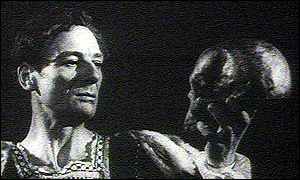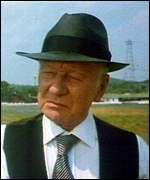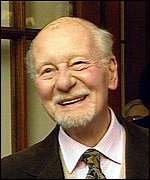Original from
BBC News
(article no longer available)
Gielgud: A giant among actors
BBC News
 Sir John Gielgud, who has died aged 96, made his name as a
Shakespearean stage actor and his performance of Hamlet more
than 50 years ago is still considered among the finest in modern
theatre.
Sir John Gielgud, who has died aged 96, made his name as a
Shakespearean stage actor and his performance of Hamlet more
than 50 years ago is still considered among the finest in modern
theatre.
Born in London in 1904, he was educated at Westminster School
and London and his parents had a career in architecture planned out
for him.
But he rebelled and persuaded them to let him train at RADA on the
basis that if he had failed to make a career of the stage by the age
of 25 he would become an architect.
He made his debut at the age of 17 at the Old Vic and had played
Macbeth by the time he was 25, as well as other Shakespearean
leads including Richard III.
By 1924 he was playing Romeo and it was so well received that
roles in Chekov and Ibsen followed and he took over from Noel
Coward in The Constant Nymph.
 He made his first trip to the United States in 1928 to play the
Grand Duke Alexander in The Patriot and his Hamlet later broke
US box office records.
He made his first trip to the United States in 1928 to play the
Grand Duke Alexander in The Patriot and his Hamlet later broke
US box office records.
Gielgud was the epitome of Englishness, with his characters
often drawn from the fading world of aristocrats and
gentleman officers.
Stage was his first love
John Gielgud delivered his lines with perfect diction in a voice one
critic called "all cello and woodwind".
But he always returned to his first love, the stage.It was his
contribution to theatre that earned him a knighthood in 1953,
joining a small elite of honoured English actors including Dame
Peggy Ashcroft and Sir Ralph Richardson.
His career could have stalled in the late 1950s with the growing
popularity of television and the changing face of the theatre.
But, never a snob, Gielgud enjoyed television and film, "visiting
other planets" as he put it.
He had a small part in the controversial film Caligula and stole every
scene in Brideshead Revisited, and as a rakish old writer in John
Mortimer's television mini series Summer's Lease.
His film work was recognised with an unlikely Oscar for his part as
Dudley Moore's butler in Arthur, a role he reprised in Arthur 2
despite his character having died.
 Even in his 80s he could still steal the show whenever he appeared
on film or television.
Even in his 80s he could still steal the show whenever he appeared
on film or television.
Sir John Gielgud remained a Shakespearean actor at heart. In
Peter Greenaway's film version of The Tempest he played Prospero,
fulfilling a lifelong wish.
Despite being 87, he shed all his clothes as the script demanded.
The West End's Globe Theatre was renamed in his honour on his
90th birthday.
Busy retirement
But he was not finished with acting and had critics purring with
admiration for his performance as a piano tutor passing on the
secret of performing Rachmaninov's daunting third concerto in the
film Shine.
In 1996 he appeared in Kenneth Branagh's Hamlet and Al Pacino's
Looking For Richard. He wrote several books, including an
autobiography Early Stages.
In April last year he appeared in a £25m production of Merlin on
Channel 4.
Only months earlier, he played Gower in Pericles for a new collection
of Shakespeare on tape.
One of the highlights of his later life was the decision to rename the
Globe Theatre in the West End, the Gielgud Theatre in his honour.
He spent the last 25 years of his life with his partner, Austrian
Martin Hensler, but eschewed pressure from gay groups to speak
out on homosexual issues.
Back to index


 Sir John Gielgud, who has died aged 96, made his name as a
Shakespearean stage actor and his performance of Hamlet more
than 50 years ago is still considered among the finest in modern
theatre.
Sir John Gielgud, who has died aged 96, made his name as a
Shakespearean stage actor and his performance of Hamlet more
than 50 years ago is still considered among the finest in modern
theatre.
 He made his first trip to the United States in 1928 to play the
Grand Duke Alexander in The Patriot and his Hamlet later broke
US box office records.
He made his first trip to the United States in 1928 to play the
Grand Duke Alexander in The Patriot and his Hamlet later broke
US box office records.
 Even in his 80s he could still steal the show whenever he appeared
on film or television.
Even in his 80s he could still steal the show whenever he appeared
on film or television.